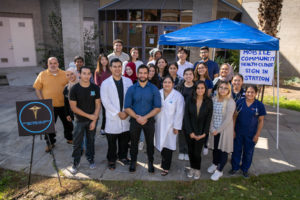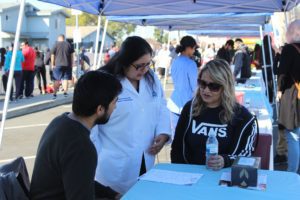Our partner highlight this month is International Collegiate Health Initiative (ICHI), a student-led health organization in Los Angeles that provides mobile clinic care to patients in need. By providing free care to the southeast Los Angeles communities of Bell and Maywood, ICHI is able to tackle some of the biggest health issues their patients face. We interviewed three board members from the University of California, Los Angeles (UCLA) about their founding, their services, and their future as a group.
We spoke to Ahmad Elhaija, the Founder and Chief Executive Officer, Rami AbuQubo, the Operations Manager, and Isabel Nakoud, the Site Logistics Manager.
Ahmad, why did you start the International Collegiate Health Initiative (ICHI) four years ago?
Ahmad: I started thinking about this organization when I was fifteen years old. My mother had always worked in the non-profit world, so I had a lot of experience in that realm at the time. When I got to UCLA as an undergraduate student, I saw a gap in what other organizations offered for patients in need. I wanted to demonstrate how students could make a significant impact with all of the resources provided by the university.
I also wanted to fill a gap within the Los Angeles health system because there are so many underserved populations. The leaders of the Bell and Maywood communities made it their mission to improve access to free healthcare, which made us a perfect match for collaboration. I saw a lot of college students who were willing to help, but just needed the right system that would allow them to work.


Who makes up ICHI staff?
Ahmad: Our staff is all made up of UCLA college students, from our outreach coordinators to our graphic designers and operations managers.
Isabel: We also have a group of medical staff volunteers, and we partner with the UCLA David Geffen School of Medicine. We are working towards partnering with other schools in Los Angeles to reach more medical volunteers. In addition, we have student volunteers who offer medical screening tests for our patients.
Ahmad: We have also started a club for Maywood high school students who serve as community volunteers. Our motto is: “Services for the community, by the community”. We did not want to arrive in these communities with a savior complex; we wanted to grow within the community, for the community.
What kind of services do your volunteers provide for your patients?
Isabel: Since our mobile clinic focuses on providing accessible preventative care, screenings are a huge part of our service to patients. We screen for multiple chronic illnesses that disproportionately affect the communities we serve, such as diabetes, high blood pressure, high cholesterol, and obesity. From this point, patients are able to speak about their test results with volunteer medical staff and receive advice on further directions to treat, manage, or otherwise prevent disease. Due to the COVID-19 pandemic, ICHI is holding virtual telehealth clinics as well as providing free, at-home COVID-19 test kits to our patients.
ICHI staff also creates and distributes resources regarding the chronic diseases we screen for, such as pamphlets and flyers on the causes, risk factors, signs and symptoms, preventative measures, and treatments. We also connect our patients with other resources within Los Angeles, such as local foodbanks for nutritional care, our healthcare partner (the Maywood Urgent Care Clinic) for supplemental care, and to the Bell Community Center for transportation to COVID-19 testing sites.
Why do you emphasize preventative care, especially within the communities of Bell and Maywood?
Rami: Our current health care system fails to emphasize the importance of preventative and primary care, especially within the communities we serve. These communities are predominately multicultural, low-income, immigrant and refugee populations, who often lack access to preventative care services. We have made it our mission to fill in the gaps within health care and advocacy for these populations. It also allows our patients to save on future medical expenses and treat their health issues before they become chronic or life-altering.
How do you evaluate the health needs of the communities you serve, and ensure that you are providing the right kind of care?
Ahmad: First, we look at published statistics that we can find online. We can also collect data through our mobile clinic. We are always looking for feedback to understand how we can improve our organization. Our goal is consistent growth, so we take this feedback seriously.
Rami: We also know that culturally competent care is valuable because it allows us to connect with our patients outside of the medical setting, which makes the patient experience much more welcoming and personal. We want to demonstrate an understanding of different values and belief systems through this culturally competent care, which is important when working within a very diverse community.

How do you let your patients know when and where you host your clinic’s services?
Ahmad: We reach these new patients in a few ways. Because we partner with the cities of Bell and Maywood, the mayors and council members put our flyers everywhere—online and in person. We also send out text-message alerts. Our high school members work to spread the word about ICHI and to make sure we are trusted within the community.
How else do you build trust with your patients?
Ahmad: Our mobile clinic is a sanctuary clinic, which means that we work specifically for undocumented patients, making sure they feel safe. Because there is a large population of undocumented individuals in the cities of Bell and Maywood we want to ensure they feel safe coming to our screening events.
Rami: We feel it is important that everyone has the same access to healthcare, regardless of their income or their residency status. We want our patients understand that we focus on the healthcare problems they constantly face.
Isabel: ICHI also has a very diverse staff, who are all empathetic to any concerns a patient might have. We all come from the communities where these health issues impact everyone in some way. So, we are all happy to participate in a project that can serve people like this in Los Angeles.

Why did you decide to partner with Rx Outreach?
Ahmad: Around the time the COVID-19 pandemic hit, a lot of our plans were put on hold. I was thinking: where do we go from here? What can we do since we have all been sent home from campus? I started brainstorming ideas, one of which was partnering with a prescription medication organization, so we could offer our patients medications. Rami was assigned to put this partnership together, and he came across Rx Outreach, which seemed like the best option.
Rami: I researched a lot of organizations, but none came close to the services that Rx Outreach provides. I wanted to make sure that we found an organization that tackles the same issues we do here at ICHI, and I saw that Rx Outreach was the most comprehensive organization for us specifically. After reading through the mission statement, vision, and organization values, I found that a partnership with Rx Outreach would be the best possible one for our patients. The mission statement specifically struck a chord in my heart, knowing that Rx Outreach wants to provide medications to all.

What keeps you motivated throughout all of the hard work that you do?
Rami: I have been passionate about public health for a long time, especially growing up facing the same kinds of issues that these communities have. Coming to UCLA, I wanted to participate in an organization with a large-scale impact, and ICHI was the perfect organization to begin pushing the boundaries of change when it comes to health care. I have always wanted to lead the programs that ICHI offers, which is why I became the Operations Manager. I want to be able to take what I learned while serving in ICHI and apply it to any future endeavor in my career.
Isabel: I was raised on public service and learning how to start grassroots organizations. I also come from a community of Syrian immigrants and refugees, so it is really exciting to be a part of a program that targets the issues that communities like these face. As a student of public health and an Emergency Medical Technician, I see so many health issues every day in Los Angeles, and I have realized that I can solve these issues by being a part of ICHI for the rest of my life.
Ahmad: I try to instill in my team that, if you feel like you are forcing yourself to do this work, you should not be doing it. I wake up in the morning excited to make an impact, to grow, and to continue to develop this organization. What I start now with ICHI will last forever. I see ICHI as an investment in my future and in the future of hundreds of people impacted by this organization.
What is your vision for the future of ICHI?
Ahmad: We would like to expand to other campuses across the country and overseas. Our main goal is to solve a health issue wherever there is an ICHI chapter. If there is an ICHI group in Atlanta, and their biggest health issue is, say, the HIV/AIDS epidemic, that is the problem we hope to solve in Atlanta. We would focus on STD testing and advocating for more affordable medications. It’s not just about setting up an identical clinic everywhere. We want to make the biggest impact possible by being responsive to the community’s specific needs.
How can people support your organization and its mission?
Ahmad: In a couple of ways! Firstly, you can like our Facebook Page (https://www.facebook.com/ICHealthInitiative). We also invite people to donate to our organization to support our clinic programming (https://www.ichealthinitiative.org/donate). Additionally, it would be great for people to spread the word about ICHI, especially if they are on a college campus and see health issues in their community. If anyone feels passionate about starting an ICHI clinic in their university’s community, we would encourage them to learn more at our website (https://www.ichealthinitiative.org), where you can also contact us (https://www.ichealthinitiative.org/contact).
